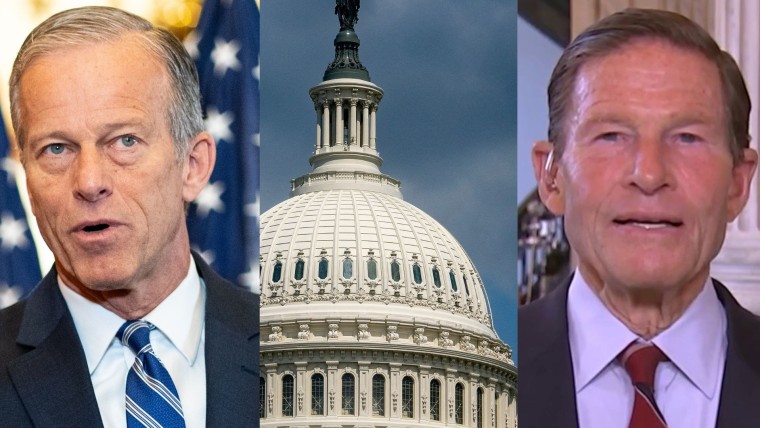The Senate agreed in the early hours of Thursday to accept more than $9 billion sent back by the Trump administration after it had already been appropriated by Congress. Even after the 51-48 vote, most GOP senators couldn’t tell you exactly which programs the legislation (known as a “rescissions package”) would defund. And the fallout could extend to one of just two Republicans to vote against the bill: Sen. Susan Collins, R-Maine, the chair of the Appropriations Committee.
We know that the legislation zeroes out $1.1 billion funding to the Corporation for Public Broadcasting over the next two years, prompting a crisis at NPR and PBS stations around the country. We also know that the package targets a wide array of foreign aid spending worth roughly $8 billion. And we know that Senate Republicans have now made a government shutdown this fall much, much more likely.
At least, we’re pretty sure PEPAR has been saved, because the details about how the cuts the Senate approved will be implemented are still unclear.
To illustrate the murkiness around this legislation, let’s start with (what seems to be) its thin silver lining: The final version of the bill included an amendment to save the President’s Emergency Plan for AIDS Relief program from being axed. At least, we’re pretty sure PEPAR has been saved, because the details about how the cuts the Senate approved will be implemented are still unclear. The Office of Management and Budget sent over a very sparse memo to Congress requesting the rescission and refused to give lawmakers a breakdown of exactly which programs at the State Department and U.S. Agency for International Development the rescissions would be affected. Determining what falls under broad categories like “international disaster aid” will be up to Office of Management and Budget staffers rather than the legislators who first appropriated the money now being returned.
The vagaries of the White House’s request left some Republicans on edge. Former caucus leader Sen. Mitch McConnell of Kentucky originally voted against moving forward with the package because of the lack of specificity. “OMB is the problem,” McConnell told reporters on Wednesday. “They won’t tell us how they’re going to apply the cuts.”

“The problem is I’m trying to have a positive view about how this rescission is going to be implemented. It’s not near as prescriptive as I would like for it to be,” retiring Sen. Thom Tillis of North Carolina told NBC News. “But if they misstep, it’ll definitely influence my posture for future rescissions.” Even Senate Majority Leader John Thune, R-S.D., conceded that “more specificity would be a good thing, and certainly more detail in terms of what exactly it is that they intend to cut as a result of all this.”
And yet all three voted in favor of sending the revised bill back to the House for final approval. Timing was likely a major factor in the senators’ decision to hold their noses. Unlike the false deadline of the reconciliation bill that President Donald Trump signed earlier this month, there really was a time limit to this proposal. Under the Impoundment Control Act of 1974, Congress had until Friday to approve the requested rescissions before the White House would be forced to spend the money.
Trump has framed opposition to these cuts as grounds for a potential primary challenge against dissenters. House Republicans dutifully sent the package to his desk in the early hours of Friday morning, passing the bill by a vote of 216-213.
Susan Collins will struggle doing her job as chief appropriator moving forward.
But that brings us to back to the struggle Collins will have doing her job as chief appropriator moving forward. Her committee is in the thick of budget negotiations for the fall. The continuing resolution that Republicans passed in early March only provides funding through Sept. 30. As of Oct. 1, without another new funding bill, the federal government will shut down.
The rescissions package might have been a win for Trump and OMB Director Russell Vought, but it makes it much harder to sell Democrats on providing the votes Collins and Thune will need to prevent a shutdown. Appropriations bills are subject to the filibuster, meaning they’ll need at least seven Democrats to get on board with their plans. And Senate Minority Leader Chuck Schumer argues that the rescissions package has poisoned the well, as has Vought's promise to send more no matter how much it hurts bipartisanship.
“If Republicans cave to Donald Trump and gut these investments agreed to by both parties, that would be an affront — a huge affront — to the bipartisan appropriations process,” Schumer said last week. “It is absurd to expect Democrats to play along with funding the government if Republicans are just going to renege on a bipartisan agreement by concocting rescissions packages behind closed doors that can pass with only their votes, not the customary 60 votes required in the appropriation process.”
Collins has a specific challenge as one of the most vulnerable senators up for re-election next year. Thune hasn’t indicated that she’ll be punished for bucking the White House on Trump’s major spending bills, not when her seat could help swing the majority, but there’s not much left to keep her in line.
In some ways, Collins is a product of a rapidly ending era: a New England Republican in a deep purple state where bipartisanship is still valued. The appropriations process that she oversees has been blunted by recissions on one hand and the reconciliation process on the other, both intended to skirt the Senate’s normal 60-vote requirement. And neither she nor any of her colleagues can credibly say that they have the same power over the country’s purse strings today than they did just a decade ago.

